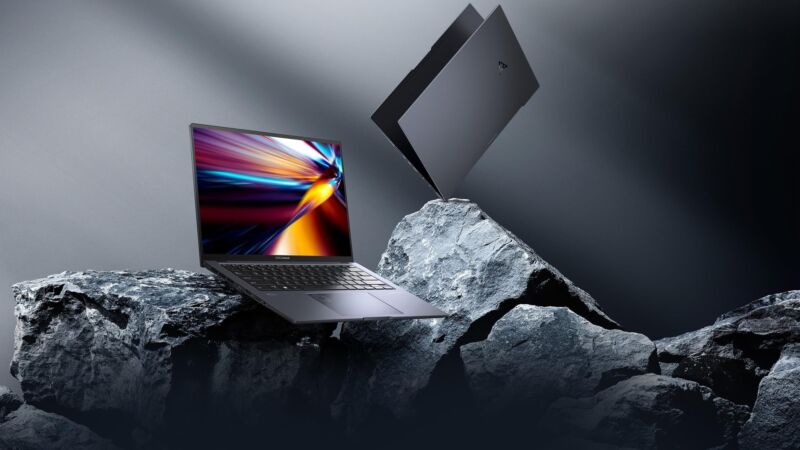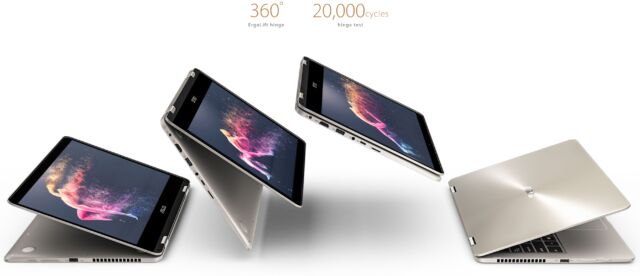[ad_1]

Lenovo filed a lawsuit towards AsusTek Laptop Inc. and Asus Laptop Worldwide, claiming that Asus’ laptops infringe on 4 of Lenovo’s patents. Lenovo is looking for damages and for Asus to cease promoting Zenbook laptops and different allegedly infringing merchandise within the US.
The lawsuit [PDF] filed November 15 within the US District Courtroom for the Northern District of California says Lenovo’s on the lookout for a jury trial and “damages, together with misplaced earnings, brought on by the alleged patent infringement.” On Tuesday, Lenovo introduced that it filed a patent infringement motion towards Asus with the US Worldwide Commerce Fee (ITC).
4 patents
The lawsuit facilities on 4 patents. The primary, entitled “Strategies and equipment for transmitting in useful resource blocks” was issued in 2021 and pertains to minimizing the delay skilled throughout an uplink bundle transmission by decreasing the variety of steps for a wi-fi machine to add knowledge.
Lenovo’s lawsuit, which makes use of Asus’ Zenbook Professional 14 OLED (UX6404) for instance of an allegedly infringing product, additionally claims Asus is promoting laptops that violate the wi-fi wake-on-LAN energy administration patent issued to Lenovo in 2010.
“For instance, previous to the ʼ066 Patent, there existed a necessity for methods to provide foremost energy to units included in a wi-fi LAN with out intervention of an operator. … The invention features a wi-fi receiver that receives a wi-fi sign,” the lawsuit says. It continues, explaining: “The receiver is linked to a foremost system whose energy isn’t on,” and that “after receiving a sign, it’s decided whether or not a magic packet is contained.” If the magic packet is current, “a sign is shipped to activate the principle energy provide to the principle system.” The lawsuit notes that the tech would not want a handshake with the wi-fi entry level.
One other patent Lenovo is suing over was issued in 2010 and entitled “Touchpad diagonal scrolling.” It permits customers to “provoke a diagonal scroll at any location on a touchpad by utilizing two fingers,” the lawsuit says.
“For instance, the Accused Merchandise assist functions, reminiscent of Google Chrome and Adobe Acrobat, and incorporate {hardware} and firmware of their touchpads, that are specifically made or tailored to observe the invention claimed in … the ’189 Patent,” Lenovo’s declare reads.
Lastly, Lenovo is upset about Asus’ purported infringing of its “Twin shaft hinge with angle timing shaft mechanism” patent rewarded in 2014. Lenovo describes it as a hinge block enabling 2-in-1 laptops to go from clamshell mode to pill mode. For this accused patent infringement, Lenovo’s lawsuit factors to Asus’ Zenbook Flip 14 UX461, which Asus advertises as having a 360-degree “ErgoLift” hinge that “lifts and tilts the keyboard into the right typing place when the show is rotated into laptop computer mode.”

Lenovo claims lawsuit was “final resort”
In its Tuesday press launch, Lenovo stated it determined to make its grievance to the ITC in response to the August 2023 filings Asus made with The Regional Courtroom of Munich patent tribunal. Lenovo claimed that Asus’ filings have been associated to mobile tech for which Lenovo had supplied Asus “a cross-licensing deal as an answer.”
In an announcement accompanying Tuesday’s launch, Lenovo deputy normal counsel and chief mental property officer John Mulgrew argued for a necessity for Lenovo to “assert [its] patent portfolio extra actively” in consideration of its roles as a licensee and licensor. Lenovo has over 28,000 patents, with 14,000 pending, it stated.
Mulgrew’s assertion highlighted curiosity from Lenovo in truthful, affordable, and nondiscrimantory (FRAND) licensing phrases.
More and more, we’re seeing some licensors bypass FRAND discussions and rely as a substitute on threats to extract inflated, supra-FRAND royalties from licensees. We expect the higher strategy entails mutual respect, openness, and equity, and outdoors help with FRAND if negotiations are at an deadlock.
As famous by The Register at this time, in a letter to the ITC dated November 15 [PDF], Lenovo stated it desires Asus to “stop and desist from advertising and marketing, promoting, distributing, providing on the market, promoting, or in any other case transferring, together with the motion or cargo of stock” merchandise that infringe upon the 4 patents in query.
In an extra dig, Lenovo added {that a} restricted exclusion order would not hurt US customers or competitors, resulting from Asus’ smaller market share. In response to the IDC, Asus represented about 7.1 % of the PC market (which incorporates laptops and desktops) in Q3 2023. Lenovo led at 23.5 %.
Ars Technica reached out to Lenovo and Asus for remark however did not obtain responses earlier than publication.
In Tuesday’s assertion, Mulgrew added that “litigation is at all times Lenovo’s final resort.” We’ve seen Lenovo get litigious about laptop computer design in one other matter not too long ago. In August 2022, it despatched a cease-and-desist letter to Framework over an O-shaped energy button in a Framework motherboard case that Lenovo stated seems to be like its Legion gaming model brand. Lenovo has additionally been on the receiving finish of latest IP-related lawsuits, together with a pricing dispute with InterDigital, (which Lenovo basically gained), and an ongoing dispute with Ericsson about 5G.
[ad_2]